May 24, 2025 | 16:22 GMT +7
May 24, 2025 | 16:22 GMT +7
Hotline: 0913.378.918
May 24, 2025 | 16:22 GMT +7
Hotline: 0913.378.918
Although there are no storms and rough seas, most fishing boats in Binh Dinh province currently are anchored at Quy Nhon Fishing Port, among them, many have been staying there for 4 months. The reason was found that the sea is empty of fish, and the catch target is not reached, while the cost of fuel (oil) is now doubled compared to the same period last year along with an increase in the prices of ice for frozen fish and food.
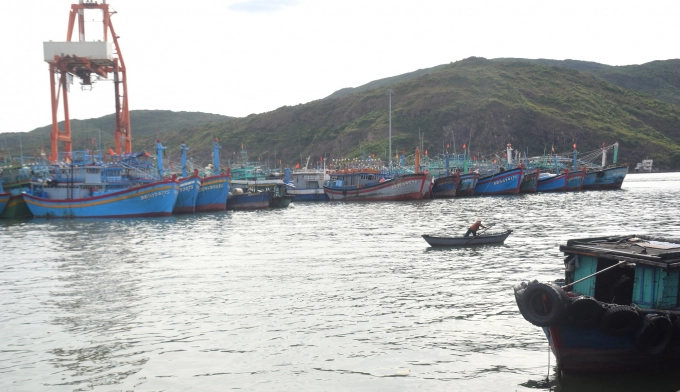
Fishing boats of Binh Dinh fishermen "lie" ashore at Quy Nhon Fishing Port. Photo: V.D.T.
Fisherman Tran Dinh Trang, 50, owner of boat BD 91243 TS, specializing in catching tuna in Dong Da ward (Quy Nhon city, Binh Dinh province) said: “I have been fishing in the sea for 35 years, but I have never seen the sea without fish like what happens this year. Fishing has not reached output, oil now has increased to nearly VND30,000/liter, so even though offshore fishing vessels receive fuel support, the revenue is still not enough to cover expenses," said Trang.
According to Trang, in previous years, each catch of tuna reached over 5-10 tons, but now, after 20 days of fishing offshore, the highest output is only 10 tons, sometimes it stood at only 2-3 tons while the amount of oil needed for each trip is between 5,000-6000 liters. Last year, 5,000-6000 liters of oil cost only VND100 million but now the price has skyrocketed to VND200 million.
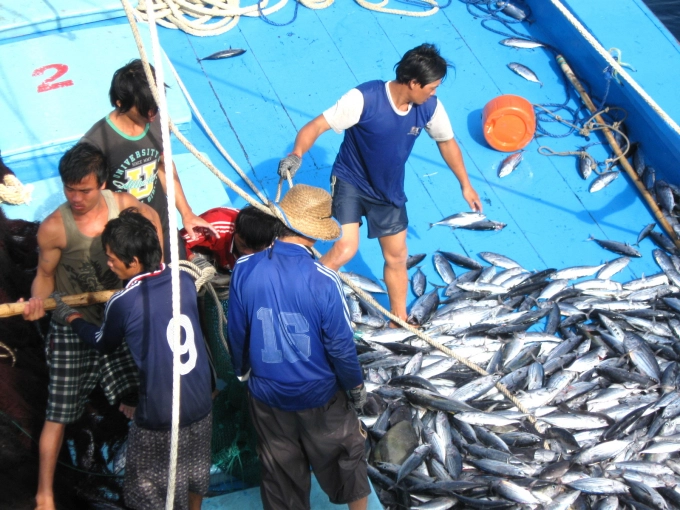
Currently, the catch of striped tuna could not reach the target, so the income from the sea voyage is not enough to cover the costs. Photo: V.D.T.
“To avoid the loss, my fishing boat has been 'lying' ashore for 4 months now... The family has no income and it is very hard to live, but no need to worry about losses and debts. Before sailing at sea, most fishing boat owners borrowed money from the merchants in advance to buy oil and food, and they would sell fish to them to pay off debts. But the sea is empty of fish at this time, every trip returns with a loss so the debt burden is growing and unable to cope," Trang revealed.
Fisherman Phan Thanh Long, owner of the boat BD 91333 TS (708CV) from Tran Phu ward (Quy Nhon city, Binh Dinh), said: "Currently, the price of striped tuna stands at only VND20,000/kg. If a fisherman can catch 7 tons and sells them at the same price after each trip, he earns about VND140 million. With the current fuel price, he has to pay VND200 million for 5,000-6,000 liters of oil, that is not including some for ice and food for the crew during the voyage. A tuna fishing boat needs a lot of labor on board, about 12-14 people. Before sailing to the sea, the boat owner pays the crew members at least VND5 million each, so he has to spend VND60-80 million more. All costs for each trip may reach more than VND300 million while selling 7 tons of striped tuna only brings them VND140 million. Thus, the boat owner lost VND160 million."
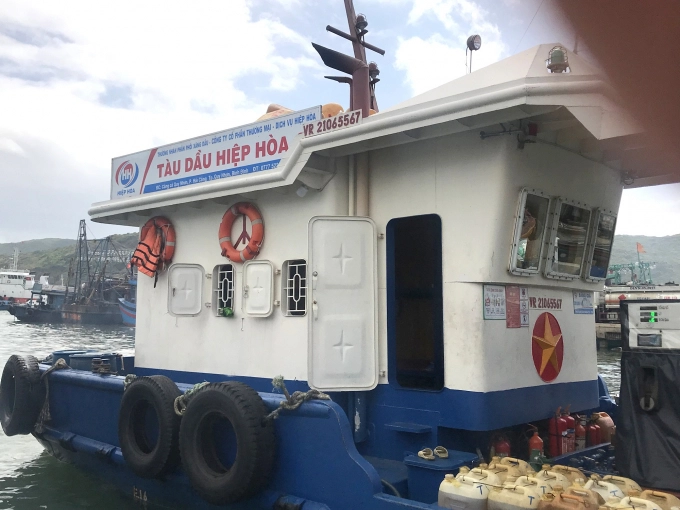
Currently, the price of oil has increased by nearly VND30,000/liter, so fishermen can't afford such a double cost. Photo: V.D.T.
“Offshore fishing vessels with large capacity are supported with fuel worth VND100 million each per trip, plus the sale of 7 tons of fish for VND140 million, the owner still suffers a loss of VND50-60 million. That is for those who catch 7 tons of fish, but for others that can fish only 3-4 tons, the loss would be even bigger. Only when they catch over 10 tons, can they afford the expenses, but this is rare now. That is why I let my fishing boat lie on the shore, not dare to go fishing," said Long.
According to Long, it is currently the south wind season and the striped tuna is in the breeding period, so the sea is empty of fish. When the north wind season comes, then the fish have grown up so a lot of fish appear in the sea. Most of the fishing boats of Binh Dinh fishermen are currently waiting for the north wind.
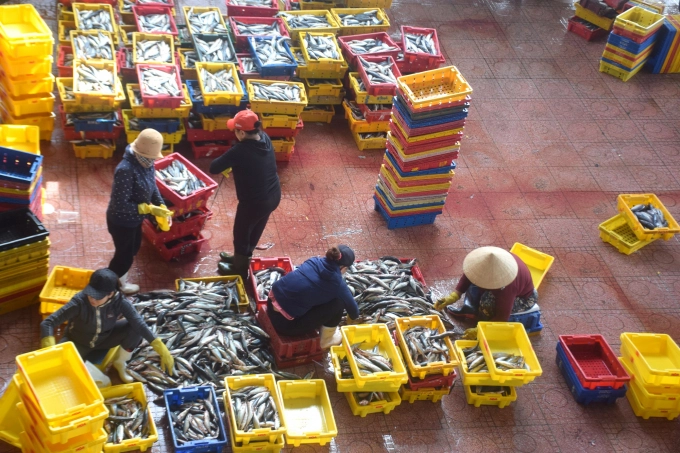
Ships are staying ashore, fish are less on shore, and seafood is not enough for exports, so businesses have to spend more on storage. Photo: V.D.T.
“Last year, my boat BD 91333 TS had 20 voyages at sea catching 20-25 tons of fish each. Now it has been almost half of July, but I can only take 4 trips. From now until the end of the year, I can only have 6 more trips, 10-12 ones lower than last year. It is really a big loss," Long shared.
“The number of fishing vessels and goods passing through Quy Nhon Fishing Port currently accounts only for about 70% compared to the same period last year, proving that many fishing vessels are lying on the shore despite the Covid-19 pandemic has been controlled, unlike last year it was raging. The reason is due to the high oil price, leading to an increase in logistics costs, and making total cost rise by 40-50%. When many fishing boats are on the shore, logistics services also 'die', and the consumption of goods for the boat during voyages this year also decreases by 40% compared to last year. The seafood purchasing service is equally miserable since the quantity is not enough for export thus must be stored resulting in a storage cost increase," said Mr. Dao Xuan Thien, Director of Binh Dinh Fishing Port Management Board.
Translated by Linh Nguyen
/2025/05/22/5250-1-184853_288.jpg)
(VAN) According to a representative from the Central Retail Vietnam, Vietnamese products such as seafood, sweet potatoes, dragon fruit, coffee, and spices hold great potential in the Thai market.

(VAN) A multi-channel, multi-directional strategy only works when the agricultural value chain meets global transparency and SPS standards.
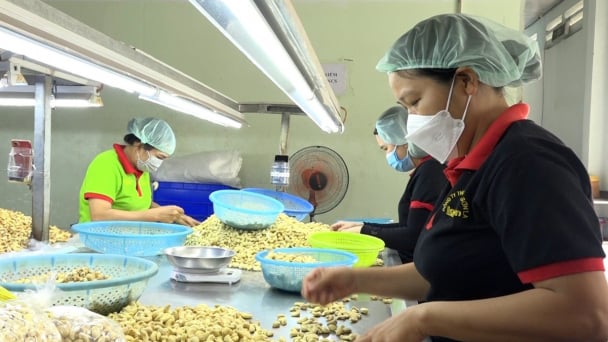
(VAN) Market expansion is a matter of survival for Vietnamese businesses amid fierce competition and global supply chain fluctuations.
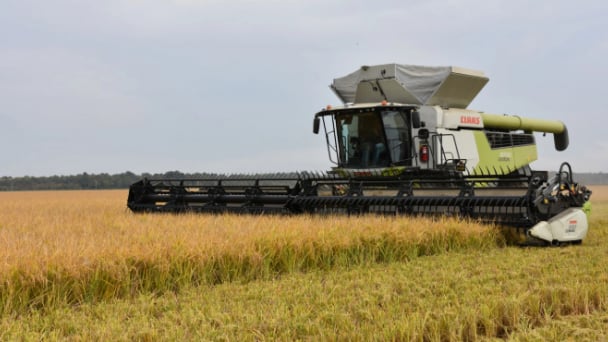
(VAN) Global market prospects for U.S. long-grain rice for the upcoming marketing year.
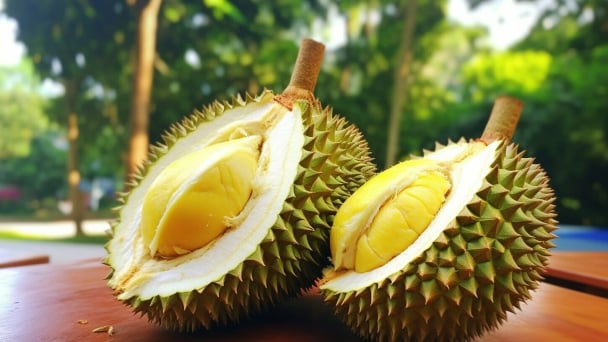
(VAN) China’s General Administration of Customs started permitting fresh durian shipments from Cambodia after a phytosanitary protocol was signed with the Cambodian Ministry of Agriculture in late April.
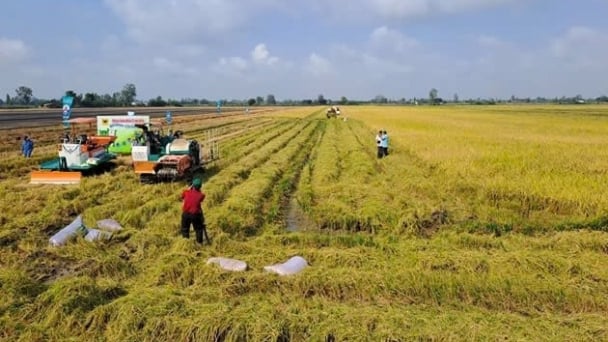
(VAN) To operate carbon market, one of the key issues is determining which types of 'commodities' meet the standards to be traded on the market.
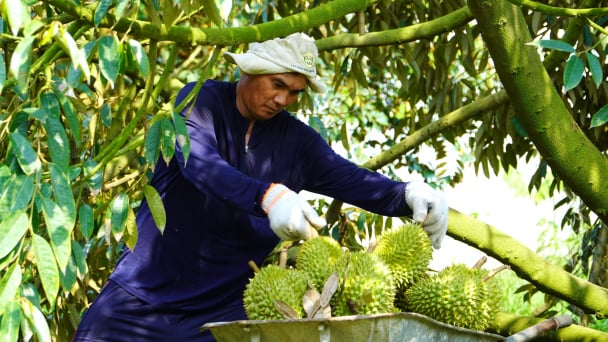
(VAN) Durian-producing localities need to coordinate more effectively with central authorities to improve the traceability, monitoring, and response systems in case of violations.